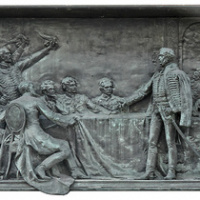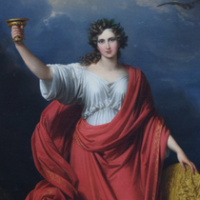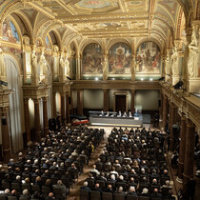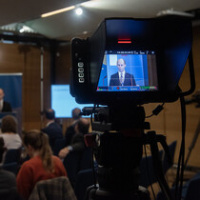- Címoldal
- Eseménynaptár
- Images of Hell, Images of Heaven: Can Pictures A...
Images of Hell, Images of Heaven: Can Pictures Alleviate Human Suffering?
Workshop
Időpont
2023. május 30. 14.50-17.50 óra között
Helyszín
Online
Zoom-esemény, élőben
Részletek
Zoom
https://us02web.zoom.us/j/83642201516?pwd=cnVwWlpKMldpSWMzYm9EYnZqaThTdz09
Meeting ID: 836 4220 1516
Passcode: 930063
The texts of the talks to be presented will be accessible online well before the event, watch for http://www.hunfi.hu/nyiri/IM/IM.pdf.
Discussion directed by Prof. Dr. Petra Aczél, Professor of Rhetoric and Communication at Moholy-Nagy University of Arts and Design, Vice-Chair, Committee for Communication and Media Theory, Hungarian Academy of Sciences.
14.50–14.55 Introduction
by Kristóf Nyíri, Chair, Committee for Communication and Media Theory, Hungarian Academy of Sciences
14.55–15.05 Images and Transcendence
Talk by John Haldane, Fellow of the Royal Society of Edinburgh (FRSE) and Member of the Pontificia Accademia per la Vita (Pontifical Academy for Life). Among his many affiliations he is Professor of Moral Philosophy Emeritus, Senior Fellow, Centre for Ethics, Philosophy and Public Affairs, Department of Philosophy, University of St Andrews, UK. From 2010 to 2020 he was Chair of the Royal Institute of Philosophy, London.
15.05–15.15 The Rhetoric of Apocalypse
Talk by Petra Aczél, Professor of Rhetoric and Communication at Moholy-Nagy University of Arts and Design. She is Vice-Chair of the Committee for Communication and Media Theory, Hungarian Academy of Sciences.
15.15–15.25 Pictures of ‘Hell’ in the Brain
Talk by Valéria Csépe, Professor Emerita of Cognitive Neuroscience and Psychology at the Brain Imaging Centre (Centre for Natural Sciences of the Eötvös Loránd Research Network), core member of the Multilingualism Doctoral School at the University of Pannonia, and president of the Hungarian Accreditation Committee.
15.25–15.35 Hidden Images: Concealing to Reveal
Talk by Professor Nicholas J. Wade, FRSE. Wade received his BSc degree in Psychology from the University of Edinburgh and his PhD from Monash University, Australia; his thesis was on vestibularvisual interaction. This was followed by a postdoctoral fellowship from the Alexander von Humboldt Stiftung, at the Max-Planck-Institute for Behavioural Physiology. His subsequent academic career has been at Dundee University, where he is now Emeritus Professor and is a Fellow of the Royal Society of Edinburgh.
15.35–15.45 The Future of the Everlasting Man: Places of the Afterlife according to the Hebrew Scriptures and the New Testament
Talk by Szilvia Finta. She holds a PhD in Judaic Science, an MA in Jewish Cultural History from the Jewish Theological Seminary – University of Jewish Studies (Budapest), an MA in Philosophy from Eötvös Loránd University, and a BA in Theology from Saint Paul Academy, Budapest. She works as an assistant professor at Saint Paul Academy, and as a lecturer at Eötvös Loránd University.
15.45–15.55 The Long Rise from Hell to (hopefully) Heaven: The Voyage of the Children from Limbo
Talk by Kristof K. P. Vanhoutte, a Belgian philosopher, Core Faculty at the Paris Institute of Critical Thinking, and research fellow at the University of the Free State, Bloemfontein, South Africa. He used to be Visiting Professor at the Pontificia Università Antonianum in Rome, Italy, and, previously, a postdoctoral fellow in Philosophy at the Institute of Advanced Studies in the Humanities, University of Edinburgh.
15.55–16.05 Can Pictures of Hell Alleviate Human Suffering? Seen Through the Eyes of Dante and Boccaccio
Talk by Prof. Dr. Franziska Meier, Universität Göttingen, Germany. Her recent book on 700 years of reception: Visiting Hell: Dante’s The Divine Comedy (2021, in German).
16.05–16.15 Images concerning the Last Glance
Talk by Prof. Dr. Reinhard Hoeps. Born in 1954, Hoeps studied Roman Catholic Theology, Philosophy and History of Arts in Bonn and Bochum between 1974 and 1980. Dr. theol. 1983, Habilitation 1988. From 1983 till 1993 assistant teacher at the University of Cologne. Since 1993 till 2020 Professor for systematic theology and its didactics at the University of Münster/Westphalia. Also there head of the Research Department for the Christian theory of images and theological aesthetics (1998–2020). Editor of the Handbook for Image Theology (Handbuch der Bildtheologie, 2007–2021).
16.15–16.30 Pause
16.30–16.40 Horror and Beauty: What Can Images Bring?
Talk by Barbara Tversky, a cognitive scientist fascinated by the images we create in the world to enhance and express thought. She is Professor Emerita of Psychology at Stanford University and Columbia Teachers College, was President of the Association for Psychological Science and is a fellow of the American Academy of Arts and Science. Her research has spanned memory, categorization, spatial language and thinking, event perception and cognition, diagrammatic reasoning, augmented reality, gesture, and creativity often with colleagues in linguistics, neuroscience, computer science, design, and art. She is the author of Mind in Motion: How Action Shapes Thought.
16.40–16.50 Beautiful Disaster: Visual Framing, Emotions and the Saga of Catastrophe Images
Talk by Kincső Szabó, a Communication Science PhD student at Corvinus University of Budapest and Assistant Lecturer at the National University of Public Service. She holds a background in International Relations (BA) and Media Communication (MA). Her main field of research focuses on gender biases, implicit signals and rhetorical devices in job advertisements. Further research fields include visual rhetoric, national minorities and diplomacy.
16.50–17.00 Uvalde Texas Murals of School Shooting Victims
Talk by Cynthia Freeland, Professor Emerita of Philosophy at the University of Houston. She has published on topics in ancient philosophy, feminist philosophy, film theory, and aesthetics. Her books include But Is It Art? (Oxford, 2001) and Portraits and Persons (Oxford, 2010). From 2015 to 2017 she served as president of the American Society for Aesthetics.
17.00–17.10 Like Deer in Fire Lights: Animal Photographs as Respite from Wildfire Trauma
Talk by Trischa Goodnow, professor of Speech Communication at Oregon State University and the Interim Director of the School of Arts and Communication. Her publications include analyses of visual rhetoric appearing, for example, in Visual Communication Quarterly, The Handbook of Visual Communication, and American Behavioral Scientist. Her book The Daily Show and Rhetoric: Arguments Issues and Strategies was published in 2011.
17.10–17.20 Primordial Images
Talk by Kristóf Nyíri (1944), PhD, Dr. h.c., Member of the Hungarian Academy of Sciences, Chair of the Committee for Communication and Media Theory, HAS. He is a retired philosophy professor. His main fields of research are Wittgenstein, the theory of conservatism, communication philosophy, the philosophy of images and the philosophy of time.
17.20–17.30 Volcanoes Through the Camera of Katia and Maurice Krafft
Talk by Anna Peternák, who studied painting at the Hungarian University of Fine Arts and completed her doctoral studies in 2021 with summa cum laude (consultant: Zoltán Szegedy-Maszák). Her doctoral dissertation titled Painting Beyond and Below the Horizon of (Big) Data Cloud (2020) deals with the nature of visual and conceptual similarities between images which she examined with the help of virtual databases using image recognition algorithms.
17.30–17.40 Will AI-created Pictures Make Us Happy?
Talk by Zoltán Szegedy-Maszák, born in 1969 in Budapest, where he lives and works today. Graduated from the Hungarian University of Fine Arts first from the Painting (1992), later from the Intermedia Department (1994). Currently he is a professor of the Intermedia Department. His artistic approach can be characterized by experimentalism closely related to technical media. His art became internationally known by his immersive installations from the 1990s. His artworks combine cutting edge tools with anachronistic processes both in terms of technology and meaning; intentionally confronting the viewer with the (historical) determination of our world picture by our depicting technologies.
17.40–17.50 Closing discussion
Szervező
MTA Kommunikáció- és Médiatudományi Osztályközi Állandó Bizottság




